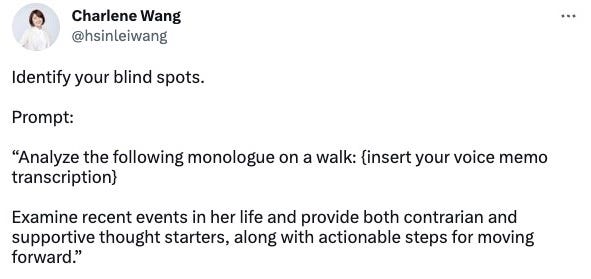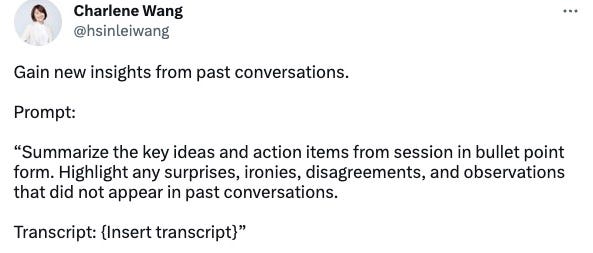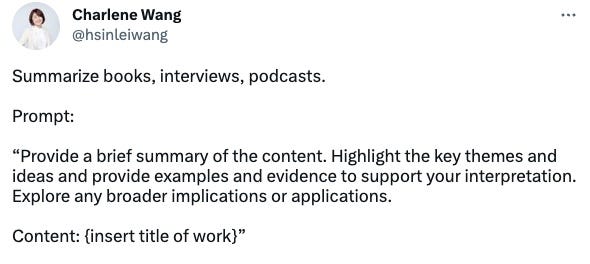Imagine having a co-pilot who knows your strengths and weaknesses. They can help you see the big picture and guide you on the steps to achieve your goals. They can provide you with valuable insights and alternative ideas that you may not have considered. They help you focus on what matters most.
Over the past few months, I've integrated GPT-4 into my daily routine. I ask GPT-4 to analyze my audio journal and share novel insights. I ask GPT-4 to analyze my daily journals and reveal patterns and blindspots that were not apparent. I also ask GPT-4 to help me brainstorm new ideas and think even more critically.
The more you share with GPT-4, the more it can help you. GPT-4 is a generic model that knows a lot of things. To get a good experience, all you need is to prompt it with the right questions and data. If you do not share any data, all you get will be a canned response. By sharing a little more, you can leverage its vast knowledge base to create a personal growth co-pilot that works for you.
Bring your own data.
In order to get personalized results from GPT-4, you need to bring your own data so the AI can tailor it to your specific experiences and interests.
Here’s how I collect data from different aspects of my life:
Recipes: I track my favorite recipes and ingredients on a table. By analyzing what fits my appetite, GPT-4 can recommend new recipes and restaurants I would like.
Reading notes: I import all my reading highlights across Kindle, PDF, and online readers into Readwise. GPT-4 can analyze my Readwise exports and give me detailed book summaries and inspirations based on my latest learnings.
Investments: I track all my investments (equity, debt, real estate, angel investment) in a table. By analyzing past deals, GPT-4 can recommend strategies that fit me.
Reflection: I journal in Notion and record with Otter. By reviewing my notes and transcript, GPT-4 can highlight hidden patterns and suggest new perspectives.
Serendipity: In addition to these structured fields, I also collect a lot of things that resonate with me but do not have clear utility today. I am still experimenting with different ways to use that database and will share more findings later.
What if you are not a digital person?
Maybe you prefer handwriting for better memory retention or habit. Maybe you like the feeling of writing on paper. Maybe you rather keep things local and private. They are all valid reasons not to have digital notes.
While you can still capture those notes and have Optical Character Recognition (OCR) extract insights, it will not be as powerful as having your digital notes work for you. Since GPT-4 does not have access to how your notes think, it can only provide you with general advice. You will not get personalized advice that works like magic.
The good news is that it’s never too late to start taking digital notes. You can start by writing down a 5-minute journal today, and try running the below prompts in a week. After all, little data is better than no data.
And what if your notes are scattered across Notion, Evernote, Tana, Superhuman, and a myriad of other apps? As you may have noticed, finding things will be a little bit slow. Since you’ll have to check Evernote first, then Notion, etc. We will cover a workaround later.
Turn GPT-4 into your personal growth co-pilot.
AI for seeing the unseeable: GPT-4 is like a Swiss Army knife for the mind. It can help us sift through the endless data generated every day and make sense of seemingly disparate concepts. It can show us patterns and connections we may have missed otherwise and help us make better use of our knowledge. But AI isn't just a tool for organizing our ideas; it can also help us break through blockers. When stuck in a rut, AI can suggest new perspectives or challenge us with opposing viewpoints. With GPT-4, we can truly turn knowledge into our power.
AI for mining new insights: GPT-4 is like a supportive coach that can help us achieve our full potential. By providing us with personalized recommendations for learning and creating, AI can help us identify areas of our lives where we could improve or new skills to explore. But AI isn't just a mirror; it can also help us see our blind spots and biases. With GPT-4, we can unlock new paths of growth that we never thought were possible.
AI for knowledge-based discussion: GPT-4 is like a productivity wizard that can help us make sense of our chaotic lives. For example, if you enter a book or YouTube video into ChatGPT, GPT-4 can share the key points and share evidence to support the interpretation, so you don't have to sift through hours of content. And if you ask a few follow-up questions in ChatGPT, you can have an informative discussion based on the content you see.
What limitations should you keep in mind?
While AI has the potential to be a powerful tool for personal growth, there are also risks associated with relying too heavily on AI.
How much power should we give to an algorithm when it comes to our personal development?
Are there risks associated with relying too heavily on AI for guidance? Will we fail to develop any key skills?
How can we balance the insights provided by AI with our own instincts and emotions? Who to trust when there's conflict?
AI, at its core, resides within a virtual machine, and its potential can only be realized to the extent of the guidance it provides. It is still up to us, as humans, to take this guidance and translate it into real-world actions—this is where we'll discover the effectiveness of AI.
GPT-4 is undoubtedly impressive, but it can never accurately predict the real-world consequences of our actions. So, it's our responsibility to balance the insights from our AI companions with our own intuition, experiences, and knowledge. Only then can we tap into the vast potential of AI-human collaboration and savor the full benefits of having a personal growth co-pilot.
Ultimately, the paths we follow are determined by our choices and actions. As we harness the power of AI, such as GPT-4, to support our growth, we must also remember to trust ourselves and our ability to adapt and learn. The real power of AI lies not in replacing human intelligence, but in amplifying it – and as we stand on the brink of this new frontier, the true potential of this partnership remains to be seen. The story is far from over; in fact, the journey has just begun.
Have you tried out any of the strategies we shared yet? Are there any other AI-powered productivity applications you’d like to see next? Let us know in the Tree Hole.
Are you interested in using AI assistants to simplify your life but unsure where to begin? If so, join our workshop and discover how human coaches and AI can work in perfect harmony to make your life more productive and enjoyable.







